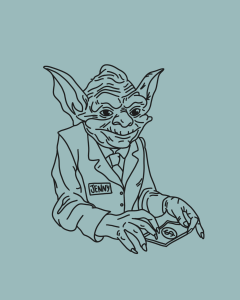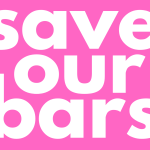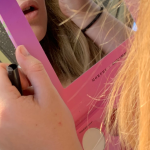
by Emma Nayfie
I’m 11 years old when I realise that I take up too much space. Mum takes me straight from school to buy an outfit for my impending Confirmation at St Mary’s Catholic Church. One of eight girls in the church group, I’m the only one that hasn’t been able to find a pretty dress to fit my large frame. For me, a young girl with heavy breasts that developed far ahead of their time and hips that demanded sizes from the women’s section in department stores, I have slim chances of finding anything that didn’t resemble either a grown woman’s bridal gown or a large, sequined garbage bag.
In mid-1990s Bundaberg, formal fashion item choices in my size outside of the bridal boutique are limited to the polyester-filled racks at Millers Fashion. I flatly refuse to try anything from these ‘old people shops’, so I watch my mother dive into the back of clothing racks at Target, trying to reach an elusive size 16 dress. We don’t find one.
I leave that day with a dark grey, floor length polyester skirt and a modest, long-sleeved black top. I hate it, and in all the photos that day I make sure my mouth twists in a sad scowl so that everyone knows it. Mum tells me not to worry – the outfit makes me look slimmer. That’s what matters is unspoken, but it sits heavily in the air between us.
* * *
When I’m 16, I realise I’m ugly. I’m washing my hands in the bathroom of my friend Carly’s house. She’s throwing a party; there are boys from school here, Nirvana songs on repeat, and warm bodies that stop just short of touching. It’s 1997 and I’ve perfected the art of deflecting attention from my bulky frame by wearing an oversized Smashing Pumpkins t-shirt, baggy jeans, silver Doc Martens, black nail polish and box-dyed black hair. A strong I totally don’t care what you think vibe.
I hear Carly’s voice through the wall between us – she’s in her room doing her makeup with our friend Taylor, who’s got a similarly large body to my own. You might be fat Tay, but you can change that, she says matter-of-factly. At least you’re not ugly like Emma. You can’t change ugly.
I see myself reflected in the mirror above the sink, but there’s something new there now, a crookedness in my nose, one eye slightly bigger than the other, blotchy freckles in a sunburst across my forehead. I poke at the new geometry of my face, and it fills me with shame. Not only do I take more than my fair share of space in this world, I’ve tarnished that space with
this asymmetry, with these blemishes. It takes me another 16 years before I question my place in this world.
* * *
At 32, I have a seven year old daughter who slips into the bathroom while I’m drying myself from the shower. She examines herself in the mirror, frowning. What are you so grumpy about? I ask. I’m not very pretty, she tells me, and it feels like a slap across my face.
When I ask why she thinks she’s not pretty, she tells me that she’s fat, her arms are too big, her stomach too soft. I could summon a multitude of platitudes in response, but all I can manage is to pull her close and hug her tightly.
So many of us spend our lives feeling not beautiful, just shy of pretty. There are unwritten rules on the space we hold in this world, and our culture demands payment from anyone that fails to conform to the elusive optimum standards of size and beauty, regardless of how fickle and shifting these standards are.
I am angry; at the world, for starting to shape my daughter in its image, at myself for all those times I’d criticised my own body with my daughter in earshot. For criticising myself at all. I know this has to be the moment things change.
* * *
I start by throwing away the magazines I’ve collected over the years; hundreds of pages of diets that promise to help me burn belly fat, products to help transform my skin, burst my capillaries into smoothness, laser away soft edges and suck flesh from the stubborn pockets of my thighs; so many ways to erase all the colours of ourselves that have bled outside the lines of a bland, uniform ideal of a woman.
I find an online community of women who are rejecting this pressure to conform. They call themselves “fat acceptance activists” and their bible is a book called Health at Every Size by Lindo Bacon, PhD. “Once you consider the extent of the magical thinking that tends to be tied in to the fantasy of thinness,” he says, “you can understand how threatening it is to consider the idea that you may never get the thin body you crave. It means that you never get to become the person you want to be.” His words stick to the walls of my heart.
I read Naomi Wolf’s The Beauty Myth. She tells me that “a cultural fixation on female thinness is not an obsession about female beauty but an obsession about female obedience” and once I’ve read that I can’t unread it. Each bite I take is an act of protest.
* * *
I am 33 when I find myself sitting in my doctor’s office, sobbing into a tissue as he records my responses to the K10 Anxiety and Depression Checklist. My blood pressure was through the roof, and the depression so severe I spent several days at home in a near-catatonic state before my husband insisted on taking me to the doctor.
I need you to think about losing some weight. He says it gently, but I immediately bristle at my GPs suggestion that my mental health issues can be solved by weighing any less than I do. I am protective of my body and will not stand for being told that it is in some way faulty or unworthy of respect. He shrugs, not wanting to get into a confrontation. Perhaps some exercise then?
Later, a friend suggests my size could be put to good use in the gym, so I begin training for powerlifting and strongwoman and they’re right. My physical strength surprises me at first, and people around me begin to admire the weights I can move not just in spite of my size, but because of it. My depression and anxiety scores improved steadily, and I find myself discovering reserves of self-esteem within myself that I had never experienced before. There’s a saying in the gym that “weight moves weight”, so as my proficiency in weight lifting increased, so do the numbers on the scale.
* * *
In four years, I add 30 kilograms to my frame and I do it unapologetically. Convinced that the fantasy of thinness is designed to oppress those that believe it, and buoyed by the community of strong women I train alongside, I grow in ways not always visible on the bathroom scales. Over those years I come to believe that the space we take up isn’t really a physical ideal, rather it’s the promise of power, for which we relinquish what power we already hold within ourselves.
I gain weight in rebellion against the beauty fantasies that hurt women around the world, from women in India who scar their faces with bleaching creams in the quest for lighter skin, to Asian women who have surgery to re-configure their eyelids in order to make their eyes
appear rounder. I gain weight to show my daughter that it does not define my worth as a woman, as a human being.
My stomach grows, along with my breasts, my hips, my thighs. After years of trying to whittle myself down to a smaller space, how strange and wonderful it feels to see my flesh stretch not in shame, but possibility.
* * *
I am 37 years old, my eyes squinting at the stark brightness cast by the hospitals florescent lighting. The nurse tells me the sleeve gastrectomy surgery has been successful, and I’m being moved to my private suite. The pain is intense, so the nurse refills my intravenous pain medication and soon after the cool sting begins to travel through my veins, I drift off to sleep wondering if I’ve made the right choice.
* * *
Twelve months before the surgery, I had walked out of my office and fallen into bed at home, utterly burnt out. Strength training had been the prescription for my mental health issues and I filled it three times a week for the last two years. It was an incredibly effective medicine, supported by anti-depressant medication and regular psychotherapy. But as I grew in size, my endurance levels in the gym suffered. My knees ached from the extra weight, and as I struggled with high repetitions of particular exercises, my technique failed and I spent an increasing amount of time on the bench with injury. The medication didn’t help either, stirring an insatiable craving for food to fill an emptiness in my soul that the medication created. Training became sporadic, then non-existent.
Without this element of self-care, my mental health issues returned with a vengeance. My doctor gave me a referral to a surgeon to discuss options around weight loss surgery. If you love your mind as much as you love your body, you might want to think about this he said. I called the surgery the next day.
* * *
I am 38 when I lower my body into the porcelain-white bathtub, the steam rising in soft curls off the milky flesh of my thighs. I sink deeper, marvelling at the way my stomach disappears
under the surface of the water. I am 40 kilograms lighter than I was a year ago, and the bath seems a lot deeper now.
I’ve lost a few friends since the surgery, but not in any explosive argument or war of words. They’ve simply stepped back from our friendship, or faded away completely. I am seen as a traitor to the fat acceptance cause; someone who succumbed to the fantasy of thinness, a perpetuator of the unrealistic beauty standards. That I’ve sacrificed the space I should take up in the world in order to fit into that elusive ideal.
My daughter, now 15, bursts into the bathroom. She wipes the steam off the mirror with the sleeve of her hoodie and moves her face closer to the mirror. What’cha doing? I ask from the tub. She pokes at a red lump on her chin, a blind pimple that’s threatening to erupt. Urgh, period pimples. She sighs, and I grimace in sympathy. Lucky I’m freaking amazing though, right? She throws me this weird hand sign I’ve seen the kids do on TikTok, smiles and bounces out of the bathroom, forgetting to shut the door.
Over the last six years I’ve learned that I won’t be able to shield my daughter from the forces in our society that conspire to turn her against herself, but I have taught her to understand that the space we take up doesn’t have anything to do with something physical. The choices I have made to show love to my body and mind may not appear on the surface to be acts of body acceptance, but I am absolutely certain that they have helped me to understand who I am on a level that surpasses the physical.
The bath might seem deeper now, but I feel like I take up much more space within it.
Emma Nayfie
Emma is an emerging writer from Meanjin (Brisbane), where she lives with her husband and rapidly growing children. She is currently studying a Bachelor of Fine Arts in Creative Writing. You can follow her work at emmanayfie.com.







